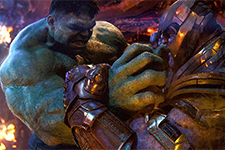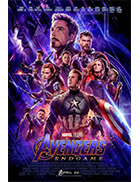Avengers: Endgame
|  Even more so than the other films in the franchise, it is all but impossible to separate what is good and bad about Avengers: Endgame from the global, time-spanning, mutimedia behemoth known as the Marvel Cinematic Universe. After all, it is the culminating entry in what is either one of the boldest and most daring experiments in long-form transmedia storytelling in film history (22 interconnected films by 16 different directors released over more than a decade, not to mention nearly a dozen related television series) or the biggest commercial juggernaut to hit the multiplexes ever (consider that at least one Marvel movie has been a top 10 box office hit for 10 of the past 11 years, with one topping the chart three of those years). Fans of the series see it as the former—an utterly engaging action epic that has held their attention for more than a decade—while its detractors see is as the latter—a massive corporate enterprise driven by commercial logic rather than artistry whose primary effect has been to transform Hollywood into a superhero production factory at the expense of pretty much everything else. And, if we’re being honest, we have to say that the MCU is both: it is an impressive feat of cohesive multimedia storytelling that, far from being spoon-fed drivel, requires a substantial degree of engagement and work on the part of the viewer to fully appreciated, but it is also a multi-billion-dollar commercial enterprise that has so dominated the multiplex in recent years that we find it a genuine surprise any time a non-CGI-heavy, fantasy-driven movie makes a dent at the box office. I tend to go back and forth, as my frustration with the sheer dominance of the MCU (along with the other massive fantasy/sci-fi franchises of the past decade, including Star Wars, The Lord of the Rings, Harry Potter, The Hunger Games, anything from Pixar, DC, etc.) is largely mitigated by the pleasure they give me. There is a great deal of variety of quality in all of these franchises, but as a whole they deliver again and again on the movie screen’s promise to be a mode of transport into other worlds, engulfing us in impossible imagery and grandiose emotions. The Marvel Cinematic Universe has done that in grand fashion since the release of Iron Man back in 2008, which—ironically enough—seemed to me to be a bit of a dicey proposition at the time, as Robert Downey Jr. was still considered a risk given his off-screen problems and Iron Man wasn’t exactly a Superman-caliber superhero. Yet, that movie did many things right (casting Downey Jr. being one of the biggest), and it launched the massive endeavor that has now reached (its first) endpoint in Avengers: Endgame. As a standalone film, Endgame hits all the right notes, hewing closely to the look and feel of the other Marvel movies (co-directors Anthony & Joe Russo are old hat at this point, having directed 2014’s Captain America: Civil War and Avengers: Infinity War). It picks up right where Infinity War left off, with the daring conceit that the film’s supervillain, an intergalatic purple behemoth named Thanos (Josh Brolin) succeeded in gaining possession of the six so-called infinity stones and using their combined power to wipe out half of all living things in the universe, which resulted in a fair number of major character slowly dissipating into clouds of ashen dust that blew away into nothingness (these included Benedict Cumberbatch’s Doctor Strange, Chadwick Boseman’s Black Panther, Tom Holland’s Spider-Man, and most of the Guardians of the Galaxy). Thus, Endgame begins in tragedy, with Tony Stark, aka Iron Man, floating in the cosmos knowing that the his and the Avengers’ best efforts have been thwarted in grand fashion, leaving him in a haze of defeat both intensely personal (“I lost the kid,” is one of the first things he says, in reference to Peter, his protégé/surrogate son) and genuinely cosmic (remember, half of all living things in the universe ceased to exist with a snap of Thanos’s fingers). There are plenty of Avengers left—Chris Evans’s Captain America, Mark Ruffalo’s Hulk, Chris Hemsworth’s Thor, and Scarlett Johansson’s Black Widow, as well as Jeremy Renner’s Hawkeye, who returns to the fold after his family dissipates in the film’s beautifully calculated opening scene). Also joining the ranks is Paul Rudd’s Ant-Man, who you might recall at the end of Ant-Man and the Wasp (2017) was in the “quantum realm” when everything went down. He accidentally gets spit out five years later, although to him it felt like five hours. That experience becomes key to the Avengers’ goal of creating a time machine that will allow them to go back and undo the damage, which necessitates Stark pulling himself away from his escape to familial bliss with Pepper Potts (Gwyneth Paltrow) and their four-year-old daughter. (All of the Avengers are coping in their own way, with Captain America leading a self-help group and Thor going into denial and basically turning into The Big Lebowski’s Dude.) The plan is risky, as it involves the remaining Avengers splitting up into teams to travel back to different moments in time to retrieve the infinity stones before Thanos can get to them, which supplies a rather clever bit of nostalgia-fueled storytelling as the characters return to moments in previous films from the franchise (specifically, Thor: The Dark World, Guardians of the Galaxy, and Captain America: Civil War). The Back to the Future franchise is dutifully name-checked as Endgame basically pulls the same stunt as Back to the Future Part II (1989), but on an even grander scale. The risks turn out to be even more substantial than previously thought once Thanos learns of the plan and tries to head it off. Much action and battle ensue, and if the first hour of this three-hour opus is a slow and steady build-up, then the last hour is pretty much nonstop action, as digital hoards descend on each other in an epic battle for nothing less than the universe itself. It’s a grand gesture and one that feels genuinely earned, a compliment that comes from someone who has often groused about how often these films struggle to find a climax other than a massive battle in which humanity’s survival is at stake. The threads of character development and relationships that have been strung and woven throughout the previous 21 films all come into play in various ways, and what I found most impressive about Endgame is how is just as often strikes notes of grace as it does moments of hectic violence (okay, okay, in terms of sheer quantity there’s a lot more violence, but the grace notes are what really stand out). In the end, Endgame is exactly what it set out to be, and while it is not necessarily the best film in the franchise (let the war of best lists commence!), it brings what can only be understood as one of great experiments in epic cinema storytelling to a satisfying close—while leaving plenty of room for the next round. Copyright © 2019 James Kendrick Thoughts? E-mail James Kendrick All images copyright © Marvel Studios |
Overall Rating: 


 (3.5)
(3.5)


